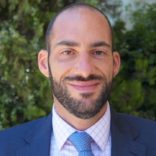Last week, Dvir Sorek — a 19-year-old hesder yeshiva student from Migdal Oz whose crime was nothing more than returning to his yeshiva in Gush Etzion — was murdered in a terrorist attack. The tragedy of his murder, compounded by the fact that his grandfather was killed in a terrorist attack 19 years earlier, prompted an outpouring of anger and sadness throughout Israel. But it also prompted another response, one that is common after Israelis are killed by terrorists inside the West Bank. Speaking the day that Sorek’s body was found, Prime Minister Benjamin Netanyahu pledged to secure Israeli sovereignty in the West Bank and to deepen Israel’s roots across all of it. Knesset Speaker Yuli Edelstein called for the government to immediately annex Gush Etzion and then extend sovereignty to every settlement in the West Bank.
Vowing to respond to terrorism is not only appropriate, it is a government’s duty, as its primary obligation is to the safety and security of its citizens. When Israelis call for security measures aimed at establishing deterrence against terrorism, they are entirely justified. But annexation of the West Bank, or even increased settlement activity, is not the right response for a variety of reasons.
The argument that the proper Zionist response is to ramp up Israel’s presence in the West Bank rests on the implication that this is punishment for Palestinian terrorism and designed to deter future attacks. When Palestinians target Jews and try to drive them out of the West Bank, they should understand that this tactic will not work, and will in fact backfire by causing the opposite response.
But for this to actually cause a change in Palestinian behavior, the reverse must be true as well. If the proper response to Palestinian terrorism is to expand Israel’s presence in the West Bank, then the proper response to Palestinian quiet and non-violence must be to decrease Israel’s presence in the West Bank. Otherwise, building more settlements cannot be expected to deter Palestinian terrorism, since no matter what action Palestinians take, the Israeli response will be to build settlements. In that environment, the logic of violence and terrorism becomes easier to sustain; the stick is not effective without the alternative of a carrot. Yet the only side of this equation for which Israeli politicians ever advocate is the punishment for terrorism and not the reward for abandoning it.
Building more settlements in response to terror also betrays a contradiction in explaining why Palestinian terrorism occurs. Nearly all politicians who advocate increasing Israel’s presence in the West Bank following terrorist attacks are also firm in their conviction that Palestinians kill Jews not because they view Israel as occupying the West Bank, but because they view Israel as illegitimate and refuse to accept the right of Jews to live even inside of the Green Line. If this view of Palestinian motives is correct, then sending a message to Palestinians that Israel will not be chased from the West Bank is the wrong message to be sending, because Palestinians don’t object to Israel’s presence specifically in the West Bank; what is required is sending a message that Israel will not be chased out of existence. If the primary obstacle is a Palestinian refusal to accept Israel, then there is no compelling reason to build more homes in Beit El over building more homes in Tel Aviv or Haifa.
There is also an issue of basic security. Policing the West Bank and keeping Israelis safe from terror is a difficult task in the current set-up. Building more settlements in increasingly isolated parts of the West Bank, or annexing the entirety of Area C where all of the settlements are located, would make this task infinitely harder. Annexing Area C — as Edelstein, Ayelet Shaked and Naftali Bennett support — would create a new geographical layout in which Israel would have to build 169 new security barriers to keep Israel separate from the Palestinian territories and move 25,000 IDF soldiers into the West Bank permanently just to patrol these 169 new borders. For all of the IDF’s incredible skill and ingenuity, not only would this require enormous manpower and effort just on the terrorism front, it would leave Israel badly exposed on every other security priority outside the West Bank.
There is no justification for brutally stabbing a 19-year-old to death simply because of where he lives or who he is. If there are tangible security measures that Israel can implement to prevent attacks like the one that took Dvir Sorek’s life, it should take them. What will not accomplish this goal is building more houses in Jewish communities in the West Bank, and in thinking about the right responses, it is critical to take a look at what proposed moves actually accomplish.
Michael Koplow is policy director at the Israel Policy Forum. His column appears the third week of the month.
The New York Jewish Week brings you the stories behind the headlines, keeping you connected to Jewish life in New York. Help sustain the reporting you trust by donating today.





